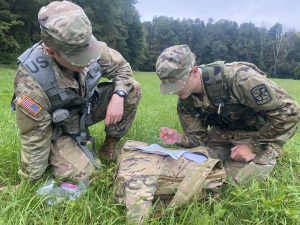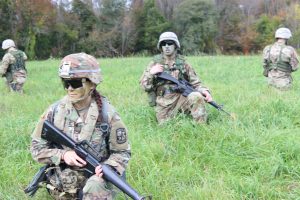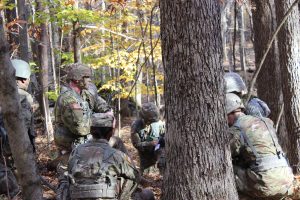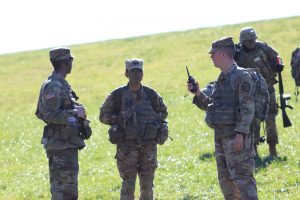Freshman Year

Fall semester introduces cadets to the personal challenge and competencies that are critical for effective leadership. Cadets learn how personal development of life skills such as critical thinking, goal setting, time management, physical fitness, and stress management related to leadership, officership, and the Army profession.
The focus is on developing basic knowledge and comprehension of Army leadership dimensions while gaining a big picture understanding of the ROTC program, its purpose in the Army, and its advantages for the student.
Spring semester overviews leadership fundamentals such as setting direction, problem-solving, listening, presenting briefs, providing feedback, and using effective writing skills. Cadets explore dimensions of leadership values, attributes, skills, and actions in the context of practical, hands-on, and interactive exercises.
Continued emphasis is placed on recruitment and retention of cadets. Cadre role models and the building of stronger relationships among the cadets through common experience and practical interaction are critical aspects of the freshman year experience.
Sophomore Year

Fall semester explores the dimensions of creative and innovative tactical leadership strategies and styles by examining team dynamics and two historical leadership theories that form the basis of the Army leadership framework (trait and behavior theories). Cadets practice aspects of personal motivation and team building in the context of planning, executing, and assessing team exercises and participating in leadership labs.
Focus is on continued development of the knowledge of leadership values and attributes through an understanding of Army rank, structure, and duties and basic aspects of land navigation and squad tactics. Case studies provide tangible context for learning the Soldier’s Creed and Warrior Ethos as they apply in the contemporary operating environment (COE).
Spring semester examines the challenges of leading tactical teams in the COE. The course highlights dimensions of terrain analysis, patrolling, and operation orders. Further study of the theoretical basis of the Army leadership framework explores the dynamics of adaptive leadership in the context of military operations.
Cadets develop greater self awareness as they assess their own leadership styles and practice communication and team building skills. COE case studies give insight into the importance and practice of teamwork and tactics in real-world scenarios.
Junior Year

Fall semester challenges cadets to study, practice, and evaluate adaptive leadership skills as they are presented with challenging scenarios related to squad tactical operations. Cadets receive systematic and specific feedback on their leadership attributes and actions. Based on such feedback, as well as their own self-evaluations, cadets continue to develop their leadership and critical thinking abilities.
The focus is developing cadets’ tactical leadership abilities to enable them to succeed at ROTC’s summer Cadet leadership Course.
Spring semester uses increasingly intense situational leadership challenges to build cadet awareness and skills in leading tactical operations up to platoon level. Cadets review aspects of combat, stability, and support operations. They also conduct military briefings and develop proficiency in garrison operation orders.
The focus is on exploring, evaluating, and developing skills in decision-making, persuading, and motivating team members in the contemporary operating environment (COE). Spring semester cadets are evaluated on what they know and do as leaders as they prepare to attend the ROTC Cadet Leadership Course (CLC).
Senior Year

Fall semester develops cadet proficiency in planning, executing and assessing complex operations, functioning as a member of a staff, and providing performance feedback to subordinates. Cadets assess risk, make ethical decisions, and lead fellow ROTC cadets. Lessons on military justice and personnel processes prepare cadets to make the transition to Army officers.
Senior cadets analyze, evaluate, and instruct cadets at lower levels. Both their classroom and battalion leadership experiences are designed to prepare fall semester cadets for their first unit of assignment. They identify responsibilities of key staff, coordinate staff roles, and use situational opportunities to teach, train, and develop subordinates.
Spring semester explores the dynamics of leading in the complex situations of current military operations in the contemporary operating environment (COE). Cadets examine differences in customs and courtesies, military law, principles of war, and rules of engagement in the face of international terrorism. They also explore aspects of interacting with non-government organizations, civilians on the battlefield, and host nation support.
The course places significant emphasis on preparing cadets for their first unit of assignment. It uses case studies, scenarios, and “What Now, Lieutenant?” exercises to prepare cadets to face the complex ethical and practical demands of leading as commissioned officers in the United States Army.